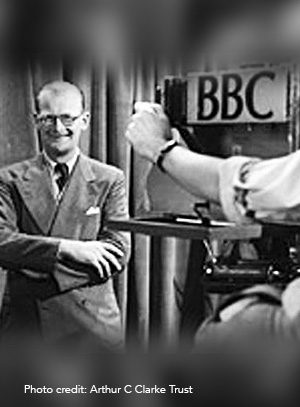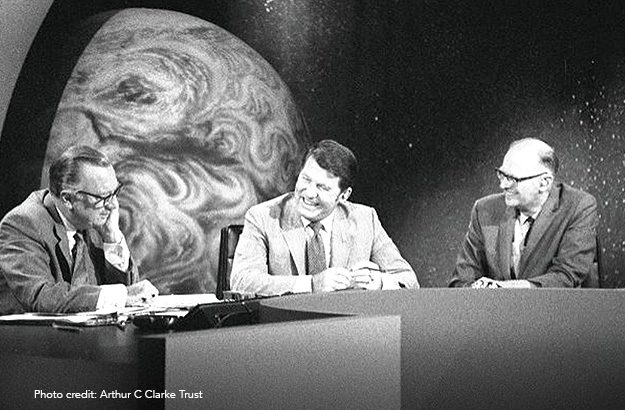Television
Clarke
Given his amiable nature and articulate scientific explanations, Arthur C Clarke was well suited to become a ‘TV pundit’ early on. Starting in the 1950s, the science writer began appearing in television shows in the UK, and then the US, discussing major tech topics ranging from space exploration and nuclear power to the rise of computers and robotics.
During the 1960s, Clarke was signed up to be a studio expert for CBS TV as the network covered a succession of US space missions culminating with Apollo XI’s first Moon landing in July 1969. Hosted by CBS anchor Walter Cronkite, Clarke and fellow science fiction writer Robert Heinlein talked about the historical significance of NASA’s achievement. The program featured a discussion just after the landing, with a second segment following the first moonwalk by Neil Armstrong and Buzz Aldrin. Read more here.
Clarke’s most extensive television involvement started in 1980 with Arthur C Clarke’s Mysterious World. Produced by Yorkshire TV for the ITV network in the UK, it was a 13-part series looking at unexplained phenomena from around the world. While the production team roamed the world researching and filming case studies, Clarke filmed his segments to camera from various locations in Sri Lanka.
The show’s success led to a follow-up series of another 13 episodes, called Arthur C Clarke’s World of Strange Powers. It first aired in 1985 and investigated various examples of the paranormal.
Almost a decade later, producers of the original series and their sceptical inquirer host came together to produce Arthur C Clarke’s Mysterious Universe, a 26-part TV series looking at unexplained phenomena across the universe. It was first broadcast by the Discovery Channel UK starting from July 1994.
“
Every TV programme has some educational content: the cathode ray tube (and now the plasma screen) is a window on the world; indeed, on many worlds. Often it’s a very murky window, but I’ve slowly come to the conclusion that, on balance, even bad TV is preferable to no TV at all. ”
”
– Arthur C Clarke

A BBC interview in 1950s

Joining CBS live coverage on first moon landing, 1969